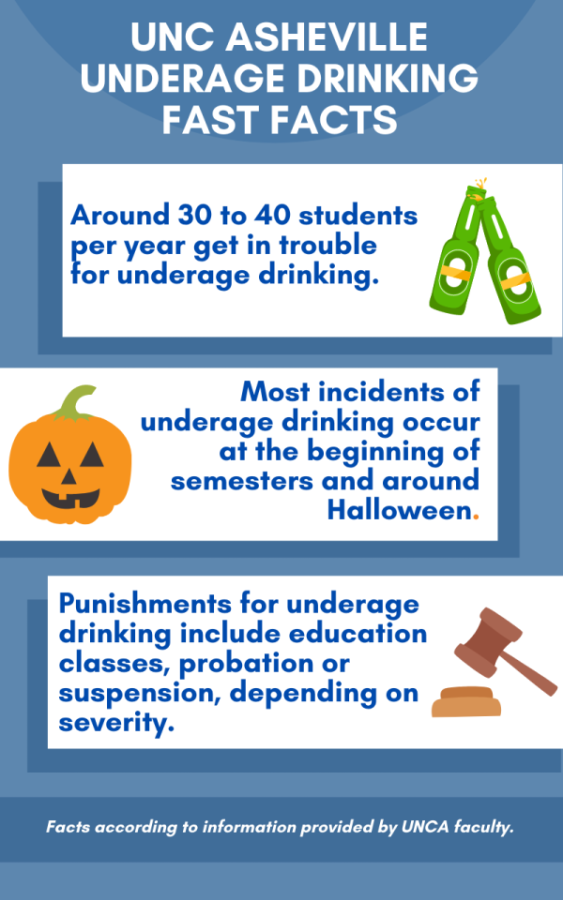Drinking poses consequences for students and athletes
Trends illustrate the extent to which underage drinking exists on campus.
April 26, 2022
UNC Asheville faculty said students, including student-athletes, may turn to drinking because of the drinking culture that surrounds college.
“I start to get worried as a mental health provider when people are drinking by themselves and are starting to drink a lot more than usual,” said Laura Jones, associate professor of health & wellness and UNCA athletics mental health coordinator.
According to Jones, if students are drinking as a coping mechanism, then they are not actually taking care of their health and not addressing their personal health.
“Heavy drinking for underage students will have a greater impact on the continuity of their brain development which will lead to more consequences,” Jones said.
UNCA faculty said drinking is allowed on campus, as long as the student or students are of the legal age.
“Drinking is a toxin. It impacts health in a variety of ways, passing through the system into the brain quickly alters judgment and reaction times. It also acts as a depressant. It can decrease immune function,” said Aubrey Mast, lecturer in health and wellness.
According to Melanie Fox, interim associate vice chancellor of student affairs, students are allowed to drink in dorms or rooms off campus if they are 21 and in their rooms with other students also of age.
“Our drinking ages are somewhat arbitrary in terms of brain development since there is some understanding that the final parts of the brain which are the prefedal cortex don’t fully develop until early to mid-20s,” Jones said.
According to Jones, if student-athletes are drinking socially and are not binge drinking, not doing anything risky and not causing any negative adverse outcomes, then it may not have many consequences.
“If students are heavily consuming alcohol or binge drinking, there will be negative consequences, and that’s just the nature of alcohol,” Jones said.
UNCA health and wellness teachers said students turn to drinking to escape the stress from school and blow off steam.
“Homesickness and depression can also cause students to use alcohol and be able to numb those feelings,” Fox said.
According to Jones, students turn to drinking because it’s one of the most socially acceptable forms of self-coping.
“The predominant reason students turn to drinking is the new independence and they might not have had the opportunity to drink before college,” Fox said.
Depressive symptoms can easily lead to addiction. The immune system can become weakened and heavy drinking can lead to social isolation, guilt and a loss of connections, Mast said.
“Probably about 30 to 40 students per year get in trouble for underage drinking, but we actually have more students who get in trouble for marijuana use than underage drinking,” Fox said.
According to Fox, most of the incidents with underage drinking occur at the beginning of the school year and around Halloween.
“Most of the underage drinking incidents occur on campus. We really aren’t aware if underage drinking is going on off campus unless we are called by the police,” Fox said.
UNCA students will need to go through a citizenship education process which is the student conduct process. Usually, if it isn’t a serious incident they do a one on one meeting, Fox said.
“It can get to the point where we are worried about the students’ health and worried they think it’s okay to sleep it off,” Fox said.
For a second or third time incident, students have to go to UNCA’s on-campus assistance counselor while being on probation as well. This could lead to suspension from residence halls, Fox said.
“I tell students to be aware that drinking is actively consuming a toxin. The act of a hangover is your body trying to rid itself of toxic exposure. There are consequences to that not only physiologically but also psychologically,” Mast said.
For student-athletes, it is up to the head coach to levy punishment, and they can decide how many strikes an offender gets. For some coaches, that strike can be one.
“I believe that students have more of that accountability to call out their friends when they notice the increase of alcohol use. Help them get connected with other resources that are out there whether it’s on campus or off campus,” Jones said.


















